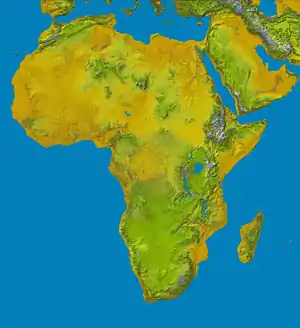Africa

Africa's size can easily be misjudged, since the rectangular Mercator world map projection that many mapmakers use makes polar regions of the earth seem larger than they really are, and tropical regions of the earth seem smaller than their actual size. Anywhere on the African continent is closer to the equator than the North Pole. Therefore, Greenland and mainland Antarctica, which are closer to their respective poles than the equator, seem large on the Mercator map, while the African continent seems much smaller. However, Africa is still a huge continent.
Africa, although it is among the largest of the continents, lacks large, lengthy mountain ranges that go across great distances. Instead, Africa is largely dominated by flatter land, often in the savanna, the tropical rainforests, and the Sahara Desert. The main exceptions are the Atlas Mountains in Morocco, the varied terrain going south from Ethiopia on Africa's eastern side (including the rift valley and Mt. Kilimanjaro), and the mountain ranges in South Africa.
Africa's northern tip — the location of northern Algeria, Libya, and Tunisia — is wetter than the Sahara Desert to the south and is somewhat like Southern Europe, which is to the north across the Mediterranean Sea. The Suez Canal, which is of course a man-made structure, separates Africa from Asia. To the west of the canal is one of Africa's main features, the longest river in the world—the Nile. The Nile River flows north from Lake Victoria to the Mediterranean Sea, going through the eastern side of the Sahara Desert on its way. Two forks of the Nile River, the Blue Nile and the White Nile, merge in present-day Sudan and then the Nile River winds north to the Mediterranean.
Going west across North Africa, the land is dry unless you are within a fairly short distance of the coastline; just south of the Mediterranean Sea is the Sahara Desert, the world's largest desert, which dominates much of northern Africa. There are some mountains in the Sahara Desert, but mostly, it is flat land compared to mountain ranges like the Andes, the Rockies, and the Himalayas.
South of the Sahara Desert is a tropical region, around the equator. If a traveller were to go south from the Sahara Desert, he would notice that his surroundings were getting wetter; eventually, he would reach the wet, rainforest regions in west-central Africa. These are some of the wettest places on Earth, and a major river, the Congo (or Zaire) River, drains much of this region. The continent gets narrower (in the east/west direction) around this point.
To the south of the equator is, again, desert and, to the east of the Namibian desert, a flatter region around Zimbabwe and Botswana. South again, at the southern tip of the continent of Africa, are some more mountain ranges. Far, far south, close to the southern tip of the African continent, is the Cape, the location of Cape Town, and there is a famous (and dramatic), flat-topped mountain at this Cape.
Meanwhile, on the eastern side of the continent is a mountainous region with more varied terrain. The scenery in this region can be dramatic; this is the Great Rift Valley of eastern Africa. On the eastern side of Africa is Mt. Kilimanjaro, which is Africa's highest peak at nearly 20,000 feet (6,100 m). Near southeast Africa is the island of Madagascar, a large island with varied terrain.
Africa has some large and notable lakes; at the start of the Nile River is the largest, Lake Victoria; to the south of Lake Victoria are two other large lakes, Lake Malawi and Lake Tanganyika; and on the southern side of the Sahara Desert is a large lake called Lake Chad (Lake Tchad). There are also a couple particularly large reservoirs in Africa; especially famous is Lake Nasser on the Nile River; Lake Volta exists on the western side of the continent.
Besides the Mediterranean to the north, Africa does not have any large inlets that come inside the continent itself, or even any long estuaries. The closest geographical feature would probably be the Nile Delta, at the northern end of the Nile River.
Quiz
Complete the Africa quiz.
